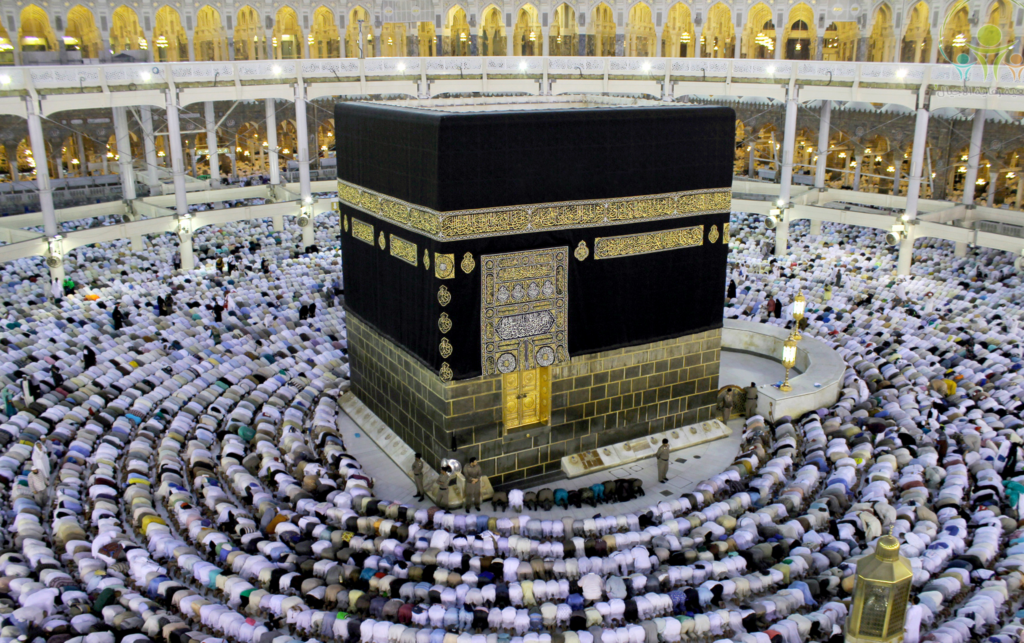
Umrah is an Islamic pilgrimage to Mecca, Saudi Arabia, that can be undertaken at any time of the year. It is often referred to as the “lesser pilgrimage” in comparison to Hajj, which has specific dates in the Islamic lunar calendar. Umrah is a significant act of worship and spiritual devotion for Muslims. Al-Dirassa Institute invites you to elevate your understanding of Islam and deepen your spiritual connection through the best online courses in Arabic, Quran, and Islamic teachings.
Don’t want to go through the translation anymore?
30 free minutes with your qualified Egyptian teacher.
Ihram: Pilgrims enter a state of spiritual purity by donning specific attire called ihram. For men, this consists of two white, seamless cloths, while women wear modest clothing that covers their entire body except for the face and hands. Pilgrims also make the intention (niyyah) to perform Umrah and recite the Talbiyah, a special prayer.
Tawaf: Pilgrims perform seven counter-clockwise circumambulations around the Kaaba, the sacred structure at the center of the Masjid al-Haram. This act symbolizes the unity of believers in the worship of the One God.
Sa’i: Pilgrims walk seven times between the hills of Safa and Marwah, reenacting the search for water by Hagar, the wife of Prophet Abraham, for her son Ishmael. This ritual is performed in a specific corridor within the mosque.
Halq or Taqsir: Male pilgrims either shave their heads (halq) or cut a portion of their hair (taqsir). Female pilgrims generally cut a small part of their hair. This act symbolizes a renewal of faith and purity.
Spiritual Cleansing: Umrah is considered a means of purifying one’s soul and seeking forgiveness from God.
Renewal of Faith: It serves as an opportunity to renew one’s faith and commitment to Islam.
Reward and Blessings: Performing Umrah is believed to bring numerous spiritual rewards and blessings, with sins being forgiven.
Timing: Umrah can be performed any time of the year, while Hajj is performed during specific days of Dhu al-Hijjah, the last month of the Islamic calendar.
Obligation: Hajj is one of the Five Pillars of Islam and is obligatory for those who are physically and financially able to undertake it at least once in their lifetime. Umrah, while highly recommended, is not obligatory.
Rituals: The rituals of Hajj are more complex and include additional ceremonies such as the standing at Arafat (Wuquf), spending nights in Mina, and the symbolic stoning of the devil.
Al-Dirassa Institute: guiding you towards a deeper understanding of your faith and a stronger connection to Allah, offerring the best online courses in Arabic, Quran, and Islamic teachings .
Discover the experiences of our delighted clients who have thoroughly enjoyed utilizing this standout feature.
Alhamdulillah I‘m very pleased with the arabic and Qur’an lessons I receive from teacher Umm Tasneem and I‘m also content with the al-dirassa administration team who were very quick in answering any questions I had. In a month I progressed a lot and I cannot wait to continue my studies with al-dirassa. May Allah reward everyone at al-dirassa.
Verified review - view original
My Qur’an teacher is fantastic, she teaches me in a loving and kind way where I look forward to the lessons and learn so much. My Arabic teacher is equally as nice and has a lot of patience with me, she has great expertise in the field and I’ve progressed really quickly with her. Thank you Al-dirassa!
Verified review - view original

Al-dirassa Institute offers you a gift to help you begin your journey to being fluent in Arabic and learning the Quran.

Al-dirassa Institute offers you a gift to help you begin your journey to being fluent in Arabic and learning the Quran.